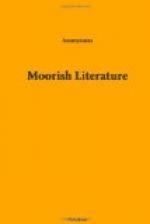“Now let the sport be ended,” the angry King decreed.
The joust was late, and every judge in weariness agreed.
And as they closed the empty lists, they heard the King’s command,
“Now seize, now seize Azarque, a traitor to this land.”
The double lines of cavaliers who led the jousting train
Threw down upon the open square the spear of idle cane;
Then swiftly seized the lance of steel and couching it for fight,
According to the royal wish rode down upon the knight.
For arms and plea must ever bootless prove
To curb the passions of a king in love.
The other band came forth to save Azarque
from his foes,
But the stout Moor waves his hand to them
ere they in battle close.
Then calmly cries: “Tho’
love, it seems, has no respect for law,
’Tis right that ye keep peace to-day
and from the lists withdraw!
Nay, gentlemen, your lances lower before
it be too late;
And let our foes their lances raise, in
sign of passion’s hate;
Thus without blood accorded be a victory
and defeat.
’Tis only bloodshed makes the one
more bitter or more sweet,
For arms or reason unavailing
prove
To curb the passions of a
king in love.”
At last they seize the struggling Moor,
the chains are on his hands;
And the populace, with anger filled, arrange
themselves in bands.
They place a guard at every point, in
haste to set him free,
But where the brave commander who shall
lead to victory?
And where the leader who shall shout and
stir their hearts to fight?
These are but empty braggarts, but prowlers
of the night,
Cut-throats and needy idlers—and
so the tumult ends—
Azarque lies in prison, forsaken by his
friends.
For, ah, both arms and reason
powerless prove
To turn the purpose of a king
in love.
Alone does Celindaja the coward crowd
implore,
“Oh, save him, save him, generous
friends, give back to me my Moor.”
She stands upon the balcony and from that
lofty place
Would fling herself upon the stones to
save him from disgrace.
Her mother round the weeping girl has
flung her withered arm.
“O fool,” she whispers in
her ear, “in Mary’s name be calm!”
Thou madly rushest to thy death by this
distracted show.
Surely thou knowest well this truth, if
anyone can know,
How arms and reason powerless
prove
To turn the purpose of a king
in love.
Then came a message of the King, in which
the monarch said
That a house wherein his kindred dwelt
must be a prison made.
Then Celindaja, white with rage:
“Go to the King and say
I choose to be my prison-house for many
and many a day,
The memory of Azarque, in which henceforth
I live:
But the treachery of a monarch my heart
will not forgive.
For the will of one weak woman
shall never powerless prove
To turn the foolish purpose
of a king who is in love.




